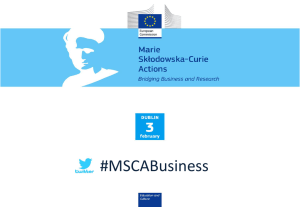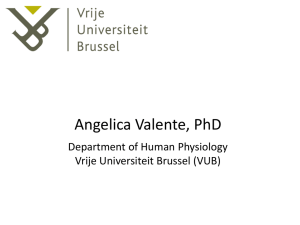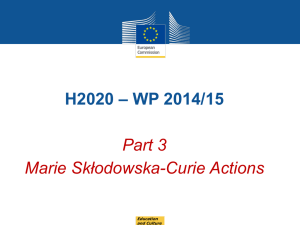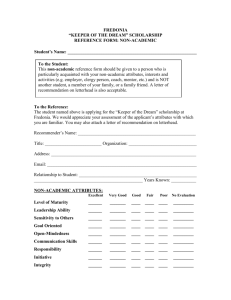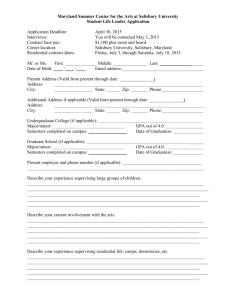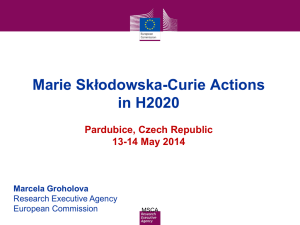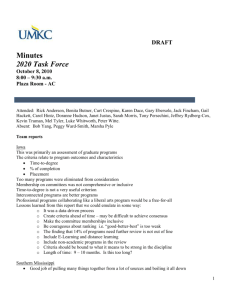Marie Skłodowska-Curie Actions
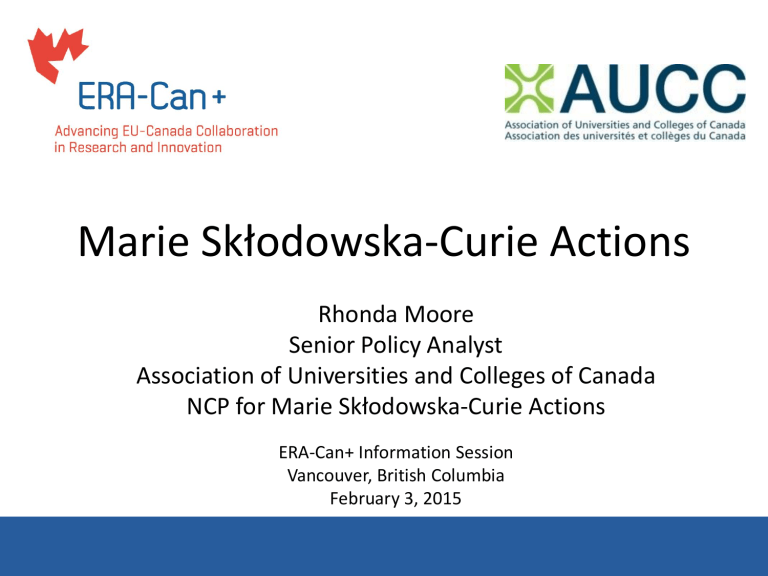
Marie Skłodowska-Curie Actions
Rhonda Moore
Senior Policy Analyst
Association of Universities and Colleges of Canada
NCP for Marie Skłodowska-Curie Actions
ERA-Can+ Information Session
Vancouver, British Columbia
February 3, 2015
Overview
•
Introduction
•
MCA under FP7
•
Four MSCAs
•
Calls and submissions
•
Role of the National Contact Point (NCP)
Marie Skłodowska-Curie Actions (MSCA)
MSCA Under Horizon 2020
• Horizon 2020 Pillar 1: Excellent Science
• Mobility and career development program
MSCA Objective
• Ensure the optimum development and dynamic use of Europe’s intellectual capital in order to generate new skills, knowledge and innovation
MSCA Budget 2014-2020
• $9.25 billion CAD
MSCA: Countries Funded
Eligible for Funding Under H2020:
• EU Member States
• Associated Countries to Horizon 2020
• 135 additional countries listed in Horizon 2020 Work Programme
Third Countries
• Funding is possible under certain circumstances
• E.g., if participation is deemed essential to a project
Additional information can be found in the Horizon 2020 Work Programme 2014-2015 Annex A: http://ec.europa.eu/research/participants/data/ref/h2020/wp/2014_2015/annexes/h2020wp1415-annex-a-countries-rules_en.pdf
Marie Curie Actions under FP7
Canadians in MCA 2007-2014
Organizations
Researchers
Projects
Total Canadian Participants
146
458
(276 fellowships + 182 exchanged staff)
140
Marie Curie Actions under FP7
Staff sent by Canadian organisations, grouped by the country of destination organisation
Marie Curie Actions under FP7
Canadian fellows grouped by country of destination
MSCAs Under Horizon 2020
Individual Fellowships (IF)
Objective
• Enhance the creative and innovative potential of experienced researchers
• Provide opportunities to acquire new knowledge, work on research projects in a European context or outside Europe, resume a career or return to
Europe
Budget
• € 213 Million in 2015
Structure
• Individual fellowships awarded to the most promising researchers
• Evaluated by 8 thematic panels or career re-start panel
Eligibility
• Experienced Canadian researchers can apply for
European Fellowships
• Canadian institutions can host
Global Fellows
Individual Fellowships (IF)
European Fellowships
Canadian researchers going to Europe
Global Fellowships
European researchers coming to Canada or going elsewhere
Innovative Training Networks (ITN)
Objective
• Support excellence in research and doctoral training
• train a new generation of creative, entrepreneurial and innovative early-stage researchers
Budget
• € 370 Million in 2015
Structure
• Three programs:
– European Training Networks
(ETN)
– European Industrial Doctorates
(EID)
– European Joint Doctorates (EJD)
• Project duration: 4 years
• Fellowships of between 3 and 36 months
• Focus on Triple “I” mobility: international, intersectoral and interdisciplinary
Innovative Training Networks (ITN)
Eligibility
• Canadian researchers
• Early-stage researchers can participate in an ITN doctoral or training programs
• Vacancies published on EURAXESS
• Canadian organizations
• Academic and non-academic organizations can be partners in ITN consortia
• Requirements vary with the type of ITN
ITN Consortia
1. European Training Networks
• Minimum of three beneficiaries (academic or non-academic) in three different EU Member States or Associated Countries
• A Canadian partner would be in addition to these three and could be either academic or non-academic
Beneficiaries Partner Organization
Academic
Beneficiary 1
Academic
Non-academic Beneficiary 2 Beneficiary 3 Academic
Academic
Partner
Organization
EU EU EU
Canada
Examples a) One university in France, one university in Spain, an SME in Denmark and a university in Canada b) A research institute in Germany, a university in Croatia, a non-profit in the U.K. and a corporation in Canada
ITN Consortia
2. European Industrial Doctorates
• Minimum of two beneficiaries in two different EU Member States or Associated
Countries
• One beneficiary must be academic and must be able to grant doctoral degrees
• The other beneficiary must be non-academic (preferably an enterprise)
• A Canadian partner would be in addition to these two beneficiaries and could be academic or non-academic
Academic
Academic
Non-academic
Non-academic
Academic
Partner Organization
Academic
Beneficiary 1
EU
Academic
Beneficiary 2
EU
Non-Academic
Partner Organization
Canada
Academic/Non-Academic
Examples: a) One corporation from Norway, one university from Latvia and one SME from
Canada b) One university from Belgium, one corporation from Romania and one university from Canada
ITN Consortia
3. European Joint Doctorates
• Minimum of three beneficiaries located in three different EU member states or associated countries, all of which must be able to grant doctoral degrees
• Canadian partner organizations can be academic or non-academic
Beneficiaries Partner Organization
Non-academic
EU
Academic
Academic
Beneficiary 2
EU
Academic
EU
Academic
Canada
Academic/
Non Academic
Examples a) Three universities entitled to grant doctoral degrees, one each in Bulgaria,
Sweden and Germany and a university in Canada b) Three universities entitled to grant doctoral degrees, one each in Italy, Austria and Hungary and a corporation in Canada
Research and Innovation Staff Exchange (RISE)
Objective
• Promote international and intersectoral collaboration through research and innovation staff exchanges
Structure
• Projects last a maximum of 4 years
• Common research and innovation project
• International and intersectoral staff exchanges of 1-12 months
Budget
• € 80 Million in 2015
Research and Innovation Staff Exchange (RISE)
RISE consortia including a Canadian partner
• Two organisations located in two different EU Member States or Associated
Countries and one organisation outside Europe
• No restriction on sector for any of the organizations
Academic Beneficiaries Academic
Beneficiary 1
EU
Academic/
Non-Academic
Beneficiary 2
EU
Academic/
Non-Academic
Partner Organization
Canada
Academic/Non-Academic
Nonacademic
Nonacademic
Examples a) A university in the Netherlands, a university in Ireland, a university in Canada b) A university in Spain, a research institute in France and a SME in Canada
Co-funding of Programs
Objective
• Stimulate regional, national or international programmes to foster excellence in researchers' training, mobility and career development
Budget
• €80 in 2015
Structure
• Co-funded doctoral programs
– Program length corresponds to typical time needed to complete a PhD in the host country
• Co-funded fellowship programs
– Fellowships typically last 12 to 36 months
• Project duration: 3 to 5 years
Co-funding of Programs
Eligibility
• Canadian researchers
• Early-stage researchers can participate in co-funded doctoral programs
• Experienced researchers can participate in co-funded fellowship programs
• Vacancies published on EURAXESS
• Canadian organizations
• Academic and non-academic organizations can be partners in COFUND projects
Co-funding of Programs
COFUND project including a Canadian partner
• One beneficiary in the EU that must be able to manage or deliver doctoral programs
• One or more partner organizations in the EU or in third countries
Beneficiary Partner Organization
Beneficiary
EU
Academic
Partner Organization
Canada
Academic/Non-Academic
Examples a) A university in France and a university in Canada b) A research funding organization in Germany and a university in Canada c) A university in Austria and a SME in Canada
MSCA: EU Contribution and No Cost to Host
MSCA Researcher unit cost
[person/month]**
Institutional unit cost
[person/month]**
Living allowance*
Mobility allowance
Family allowance
Research, training and networking costs
Management and overheads
ITN
IF
MSCA
RISE
3 110 600 500
4 650 600
Staff member unit cost
[person/month]**
500
Top-up allowance
2 000
1 800
800
1 200
650
Institutional unit cost [person/month]**
Research, training and networking costs
Management and indirect costs
1 800 700
* A country correction coefficient applies to the living allowance. CA CCC = 86,4%
**These unit costs will be subject to a funding rate of 100%.
Canadian partner can request this funding from the European employer
Horizon 2020 Participant Portal
http://ec.europa.eu/research/participants/portal/desktop/en/home.html
MSCA calls and submissions
MSCA calls and submissions
MSCA calls and submissions
Calls and submissions
Open MSCA Call
MSCA
Research and Innovation Staff Exchange (RISE)
Call Closes
April 28, 2015
Next Round of MSCA Calls
MSCA
Individual Fellowships (IF)
Co-funding of Programs (COFUND)
Innovative Training Networks (ITN)
Call Opens
March 12, 2015
April 14, 2015
Call Closes
September 10, 2015
October 1, 2015
National Contact Point (NCP)
• AUCC is the Canadian NCP for MSCA.
• As NCP, AUCC acts as a source of information for Canadian researchers and institutions wishing to learn more about
MSCA.
• Please contact MSCA@aucc.ca
with questions
